Family Law: Legal Issues and Advice for Maurice Cho's Case Study
VerifiedAdded on 2023/03/20
|8
|2088
|56
Report
AI Summary
This report provides a comprehensive analysis of a family law case involving Maurice Cho and his wife, Jessica Lim. The case presents several legal issues, including child custody, child support, and spousal maintenance, along with the implications of Mr. Cho's violent behavior. The report identifies relevant legislation such as the Family Proceedings Act 1980, Child Support Act 1991, Care of Children Act 2004, and Domestic Violence Act 1995. It outlines the issues in dispute, points of agreement, and the impact of violence on parenting proceedings. The report also details the dispute resolution process in New Zealand family law, including Family Dispute Resolution (FDR) requirements and options available to the client. Finally, it specifies the information needed before advising the client, covering aspects such as personal details, child-related information, and details of any violence. This analysis aims to provide a clear understanding of the legal complexities and potential outcomes of the case.
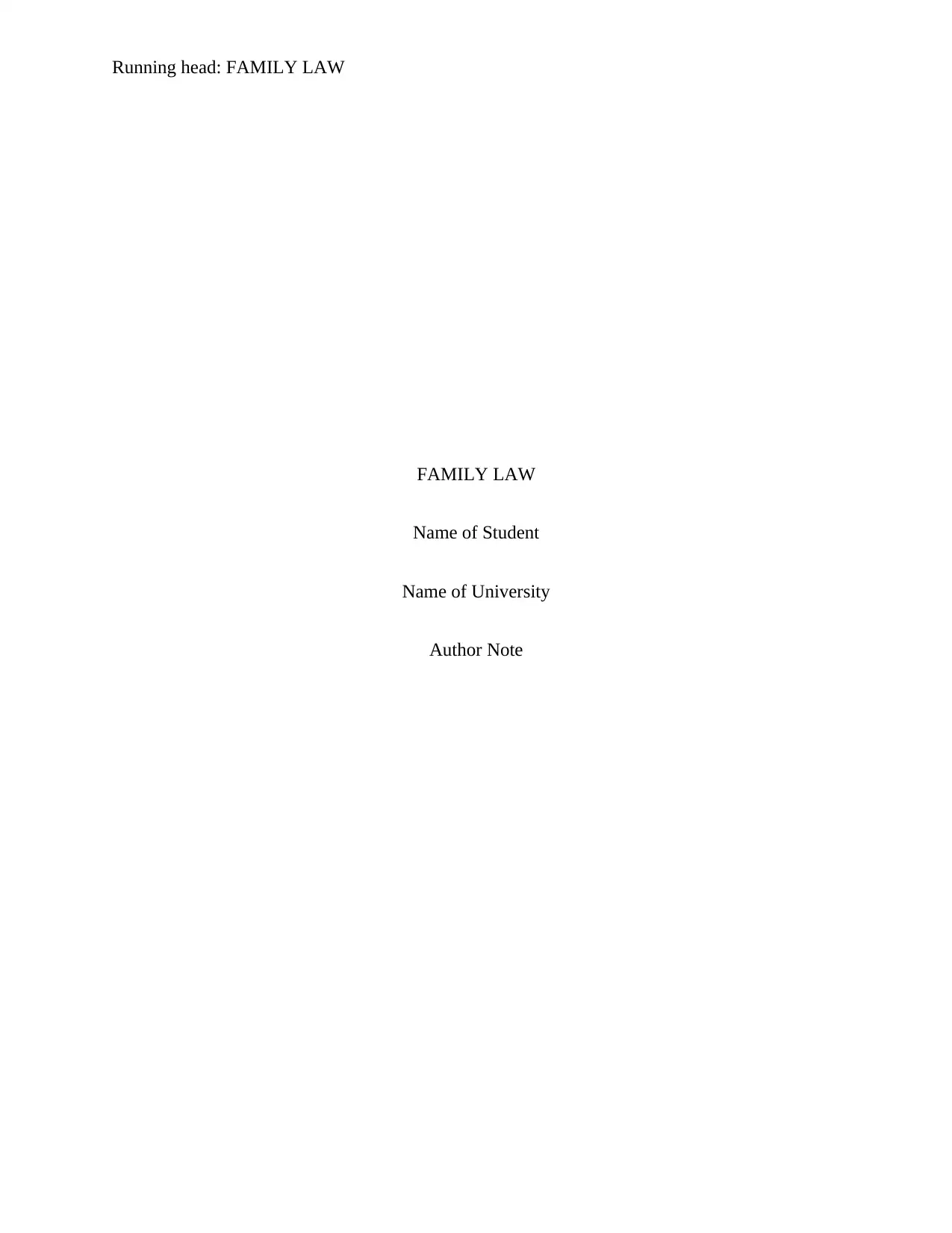
Running head: FAMILY LAW
FAMILY LAW
Name of Student
Name of University
Author Note
FAMILY LAW
Name of Student
Name of University
Author Note
Paraphrase This Document
Need a fresh take? Get an instant paraphrase of this document with our AI Paraphraser
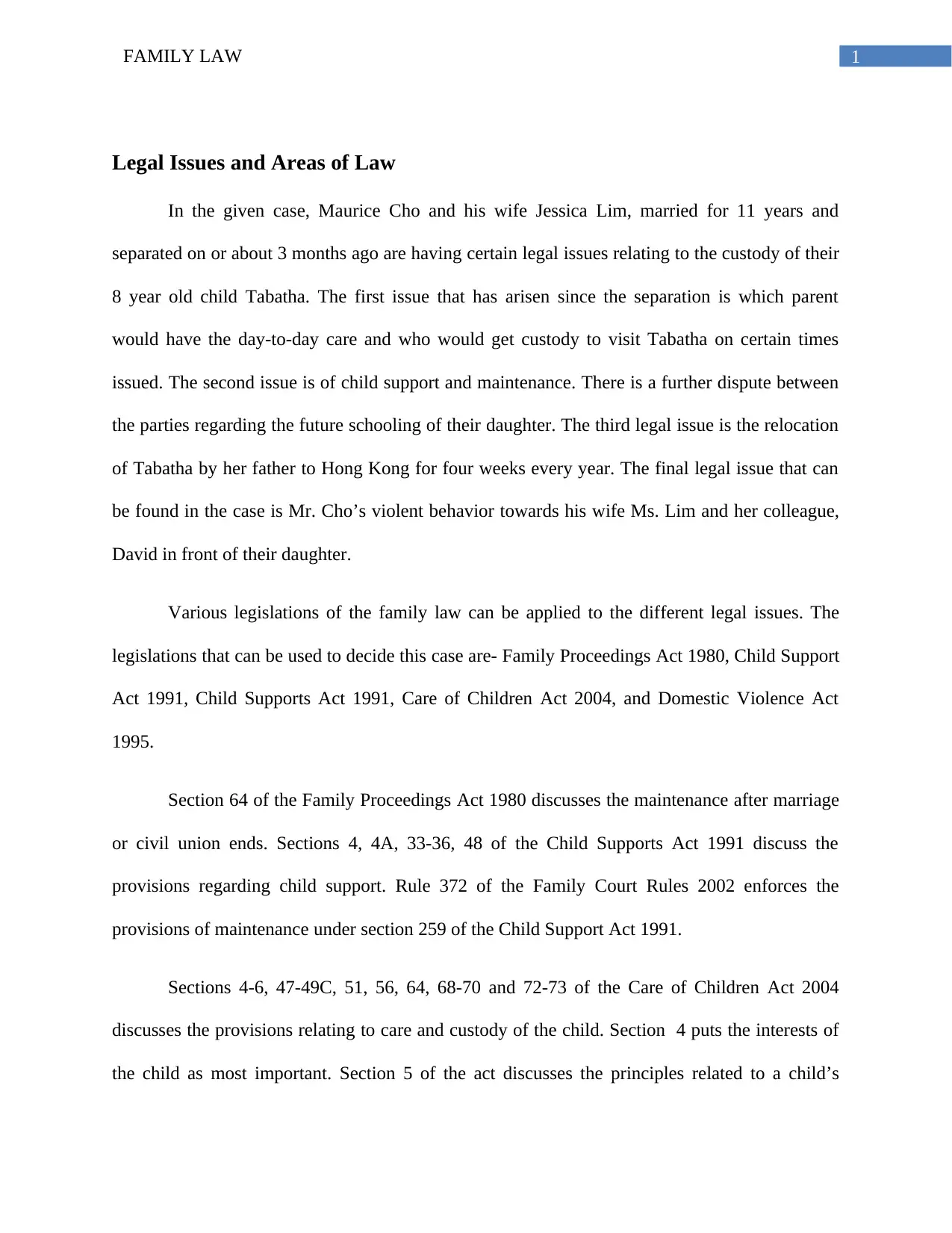
1FAMILY LAW
Legal Issues and Areas of Law
In the given case, Maurice Cho and his wife Jessica Lim, married for 11 years and
separated on or about 3 months ago are having certain legal issues relating to the custody of their
8 year old child Tabatha. The first issue that has arisen since the separation is which parent
would have the day-to-day care and who would get custody to visit Tabatha on certain times
issued. The second issue is of child support and maintenance. There is a further dispute between
the parties regarding the future schooling of their daughter. The third legal issue is the relocation
of Tabatha by her father to Hong Kong for four weeks every year. The final legal issue that can
be found in the case is Mr. Cho’s violent behavior towards his wife Ms. Lim and her colleague,
David in front of their daughter.
Various legislations of the family law can be applied to the different legal issues. The
legislations that can be used to decide this case are- Family Proceedings Act 1980, Child Support
Act 1991, Child Supports Act 1991, Care of Children Act 2004, and Domestic Violence Act
1995.
Section 64 of the Family Proceedings Act 1980 discusses the maintenance after marriage
or civil union ends. Sections 4, 4A, 33-36, 48 of the Child Supports Act 1991 discuss the
provisions regarding child support. Rule 372 of the Family Court Rules 2002 enforces the
provisions of maintenance under section 259 of the Child Support Act 1991.
Sections 4-6, 47-49C, 51, 56, 64, 68-70 and 72-73 of the Care of Children Act 2004
discusses the provisions relating to care and custody of the child. Section 4 puts the interests of
the child as most important. Section 5 of the act discusses the principles related to a child’s
Legal Issues and Areas of Law
In the given case, Maurice Cho and his wife Jessica Lim, married for 11 years and
separated on or about 3 months ago are having certain legal issues relating to the custody of their
8 year old child Tabatha. The first issue that has arisen since the separation is which parent
would have the day-to-day care and who would get custody to visit Tabatha on certain times
issued. The second issue is of child support and maintenance. There is a further dispute between
the parties regarding the future schooling of their daughter. The third legal issue is the relocation
of Tabatha by her father to Hong Kong for four weeks every year. The final legal issue that can
be found in the case is Mr. Cho’s violent behavior towards his wife Ms. Lim and her colleague,
David in front of their daughter.
Various legislations of the family law can be applied to the different legal issues. The
legislations that can be used to decide this case are- Family Proceedings Act 1980, Child Support
Act 1991, Child Supports Act 1991, Care of Children Act 2004, and Domestic Violence Act
1995.
Section 64 of the Family Proceedings Act 1980 discusses the maintenance after marriage
or civil union ends. Sections 4, 4A, 33-36, 48 of the Child Supports Act 1991 discuss the
provisions regarding child support. Rule 372 of the Family Court Rules 2002 enforces the
provisions of maintenance under section 259 of the Child Support Act 1991.
Sections 4-6, 47-49C, 51, 56, 64, 68-70 and 72-73 of the Care of Children Act 2004
discusses the provisions relating to care and custody of the child. Section 4 puts the interests of
the child as most important. Section 5 of the act discusses the principles related to a child’s
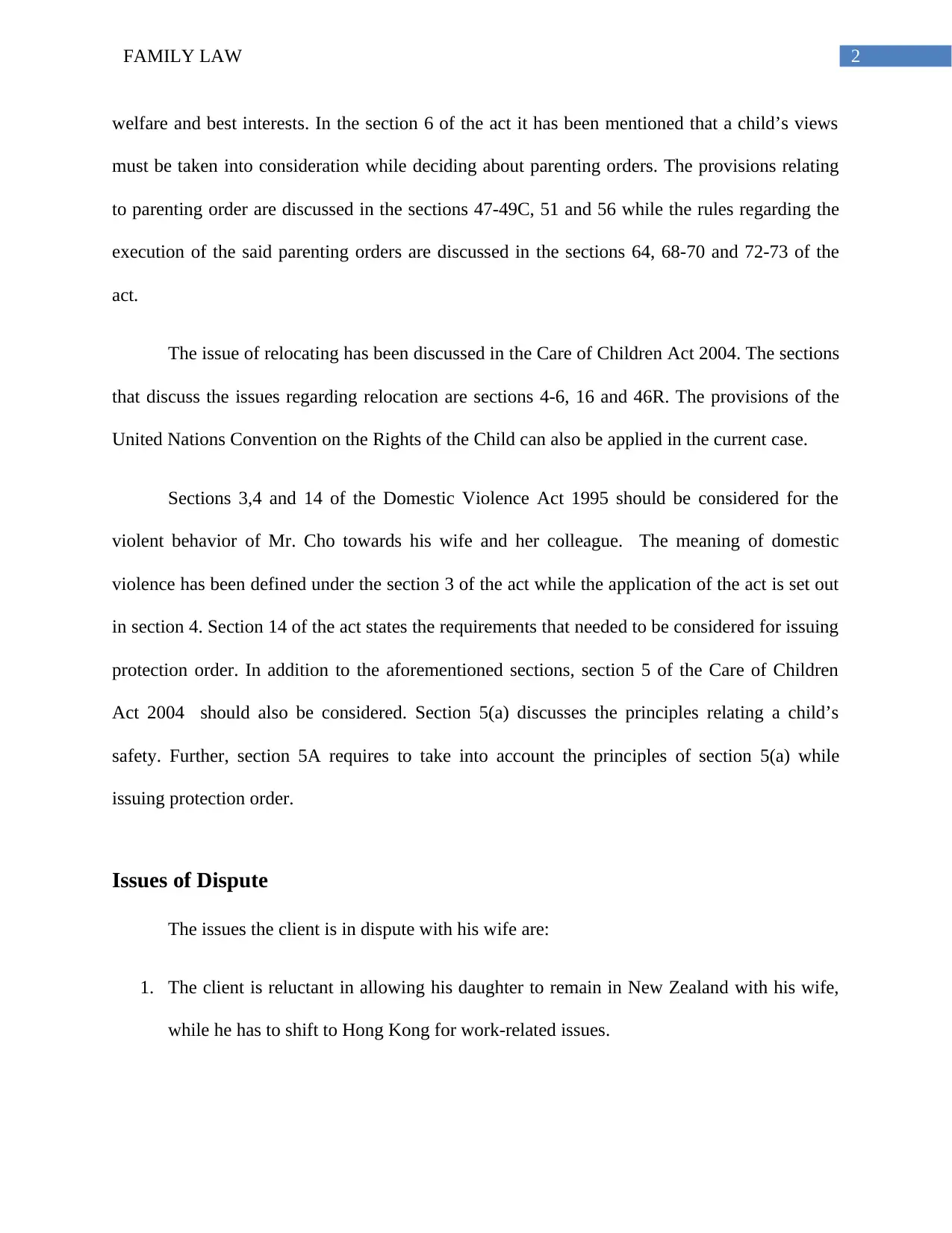
2FAMILY LAW
welfare and best interests. In the section 6 of the act it has been mentioned that a child’s views
must be taken into consideration while deciding about parenting orders. The provisions relating
to parenting order are discussed in the sections 47-49C, 51 and 56 while the rules regarding the
execution of the said parenting orders are discussed in the sections 64, 68-70 and 72-73 of the
act.
The issue of relocating has been discussed in the Care of Children Act 2004. The sections
that discuss the issues regarding relocation are sections 4-6, 16 and 46R. The provisions of the
United Nations Convention on the Rights of the Child can also be applied in the current case.
Sections 3,4 and 14 of the Domestic Violence Act 1995 should be considered for the
violent behavior of Mr. Cho towards his wife and her colleague. The meaning of domestic
violence has been defined under the section 3 of the act while the application of the act is set out
in section 4. Section 14 of the act states the requirements that needed to be considered for issuing
protection order. In addition to the aforementioned sections, section 5 of the Care of Children
Act 2004 should also be considered. Section 5(a) discusses the principles relating a child’s
safety. Further, section 5A requires to take into account the principles of section 5(a) while
issuing protection order.
Issues of Dispute
The issues the client is in dispute with his wife are:
1. The client is reluctant in allowing his daughter to remain in New Zealand with his wife,
while he has to shift to Hong Kong for work-related issues.
welfare and best interests. In the section 6 of the act it has been mentioned that a child’s views
must be taken into consideration while deciding about parenting orders. The provisions relating
to parenting order are discussed in the sections 47-49C, 51 and 56 while the rules regarding the
execution of the said parenting orders are discussed in the sections 64, 68-70 and 72-73 of the
act.
The issue of relocating has been discussed in the Care of Children Act 2004. The sections
that discuss the issues regarding relocation are sections 4-6, 16 and 46R. The provisions of the
United Nations Convention on the Rights of the Child can also be applied in the current case.
Sections 3,4 and 14 of the Domestic Violence Act 1995 should be considered for the
violent behavior of Mr. Cho towards his wife and her colleague. The meaning of domestic
violence has been defined under the section 3 of the act while the application of the act is set out
in section 4. Section 14 of the act states the requirements that needed to be considered for issuing
protection order. In addition to the aforementioned sections, section 5 of the Care of Children
Act 2004 should also be considered. Section 5(a) discusses the principles relating a child’s
safety. Further, section 5A requires to take into account the principles of section 5(a) while
issuing protection order.
Issues of Dispute
The issues the client is in dispute with his wife are:
1. The client is reluctant in allowing his daughter to remain in New Zealand with his wife,
while he has to shift to Hong Kong for work-related issues.
⊘ This is a preview!⊘
Do you want full access?
Subscribe today to unlock all pages.

Trusted by 1+ million students worldwide
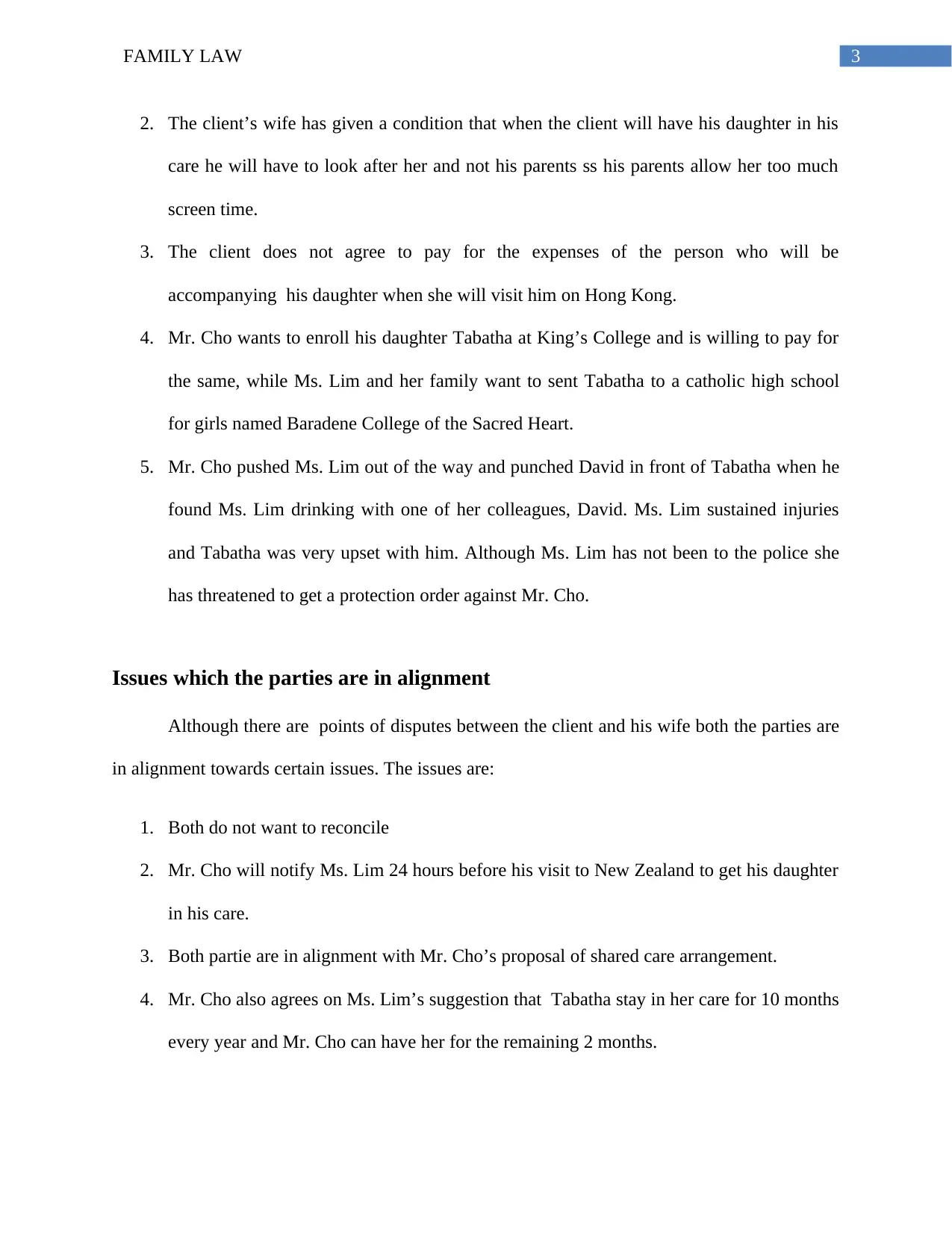
3FAMILY LAW
2. The client’s wife has given a condition that when the client will have his daughter in his
care he will have to look after her and not his parents ss his parents allow her too much
screen time.
3. The client does not agree to pay for the expenses of the person who will be
accompanying his daughter when she will visit him on Hong Kong.
4. Mr. Cho wants to enroll his daughter Tabatha at King’s College and is willing to pay for
the same, while Ms. Lim and her family want to sent Tabatha to a catholic high school
for girls named Baradene College of the Sacred Heart.
5. Mr. Cho pushed Ms. Lim out of the way and punched David in front of Tabatha when he
found Ms. Lim drinking with one of her colleagues, David. Ms. Lim sustained injuries
and Tabatha was very upset with him. Although Ms. Lim has not been to the police she
has threatened to get a protection order against Mr. Cho.
Issues which the parties are in alignment
Although there are points of disputes between the client and his wife both the parties are
in alignment towards certain issues. The issues are:
1. Both do not want to reconcile
2. Mr. Cho will notify Ms. Lim 24 hours before his visit to New Zealand to get his daughter
in his care.
3. Both partie are in alignment with Mr. Cho’s proposal of shared care arrangement.
4. Mr. Cho also agrees on Ms. Lim’s suggestion that Tabatha stay in her care for 10 months
every year and Mr. Cho can have her for the remaining 2 months.
2. The client’s wife has given a condition that when the client will have his daughter in his
care he will have to look after her and not his parents ss his parents allow her too much
screen time.
3. The client does not agree to pay for the expenses of the person who will be
accompanying his daughter when she will visit him on Hong Kong.
4. Mr. Cho wants to enroll his daughter Tabatha at King’s College and is willing to pay for
the same, while Ms. Lim and her family want to sent Tabatha to a catholic high school
for girls named Baradene College of the Sacred Heart.
5. Mr. Cho pushed Ms. Lim out of the way and punched David in front of Tabatha when he
found Ms. Lim drinking with one of her colleagues, David. Ms. Lim sustained injuries
and Tabatha was very upset with him. Although Ms. Lim has not been to the police she
has threatened to get a protection order against Mr. Cho.
Issues which the parties are in alignment
Although there are points of disputes between the client and his wife both the parties are
in alignment towards certain issues. The issues are:
1. Both do not want to reconcile
2. Mr. Cho will notify Ms. Lim 24 hours before his visit to New Zealand to get his daughter
in his care.
3. Both partie are in alignment with Mr. Cho’s proposal of shared care arrangement.
4. Mr. Cho also agrees on Ms. Lim’s suggestion that Tabatha stay in her care for 10 months
every year and Mr. Cho can have her for the remaining 2 months.
Paraphrase This Document
Need a fresh take? Get an instant paraphrase of this document with our AI Paraphraser
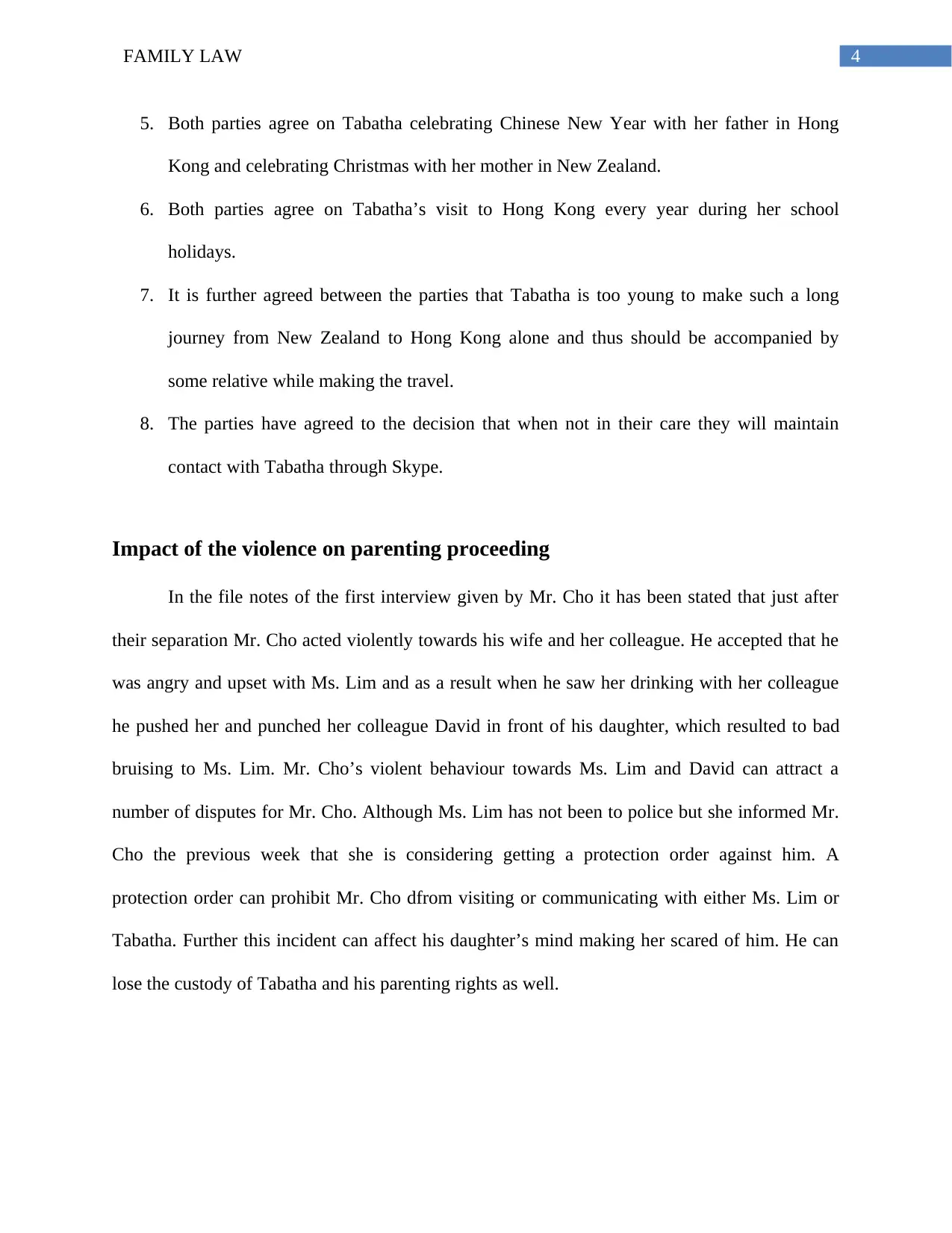
4FAMILY LAW
5. Both parties agree on Tabatha celebrating Chinese New Year with her father in Hong
Kong and celebrating Christmas with her mother in New Zealand.
6. Both parties agree on Tabatha’s visit to Hong Kong every year during her school
holidays.
7. It is further agreed between the parties that Tabatha is too young to make such a long
journey from New Zealand to Hong Kong alone and thus should be accompanied by
some relative while making the travel.
8. The parties have agreed to the decision that when not in their care they will maintain
contact with Tabatha through Skype.
Impact of the violence on parenting proceeding
In the file notes of the first interview given by Mr. Cho it has been stated that just after
their separation Mr. Cho acted violently towards his wife and her colleague. He accepted that he
was angry and upset with Ms. Lim and as a result when he saw her drinking with her colleague
he pushed her and punched her colleague David in front of his daughter, which resulted to bad
bruising to Ms. Lim. Mr. Cho’s violent behaviour towards Ms. Lim and David can attract a
number of disputes for Mr. Cho. Although Ms. Lim has not been to police but she informed Mr.
Cho the previous week that she is considering getting a protection order against him. A
protection order can prohibit Mr. Cho dfrom visiting or communicating with either Ms. Lim or
Tabatha. Further this incident can affect his daughter’s mind making her scared of him. He can
lose the custody of Tabatha and his parenting rights as well.
5. Both parties agree on Tabatha celebrating Chinese New Year with her father in Hong
Kong and celebrating Christmas with her mother in New Zealand.
6. Both parties agree on Tabatha’s visit to Hong Kong every year during her school
holidays.
7. It is further agreed between the parties that Tabatha is too young to make such a long
journey from New Zealand to Hong Kong alone and thus should be accompanied by
some relative while making the travel.
8. The parties have agreed to the decision that when not in their care they will maintain
contact with Tabatha through Skype.
Impact of the violence on parenting proceeding
In the file notes of the first interview given by Mr. Cho it has been stated that just after
their separation Mr. Cho acted violently towards his wife and her colleague. He accepted that he
was angry and upset with Ms. Lim and as a result when he saw her drinking with her colleague
he pushed her and punched her colleague David in front of his daughter, which resulted to bad
bruising to Ms. Lim. Mr. Cho’s violent behaviour towards Ms. Lim and David can attract a
number of disputes for Mr. Cho. Although Ms. Lim has not been to police but she informed Mr.
Cho the previous week that she is considering getting a protection order against him. A
protection order can prohibit Mr. Cho dfrom visiting or communicating with either Ms. Lim or
Tabatha. Further this incident can affect his daughter’s mind making her scared of him. He can
lose the custody of Tabatha and his parenting rights as well.
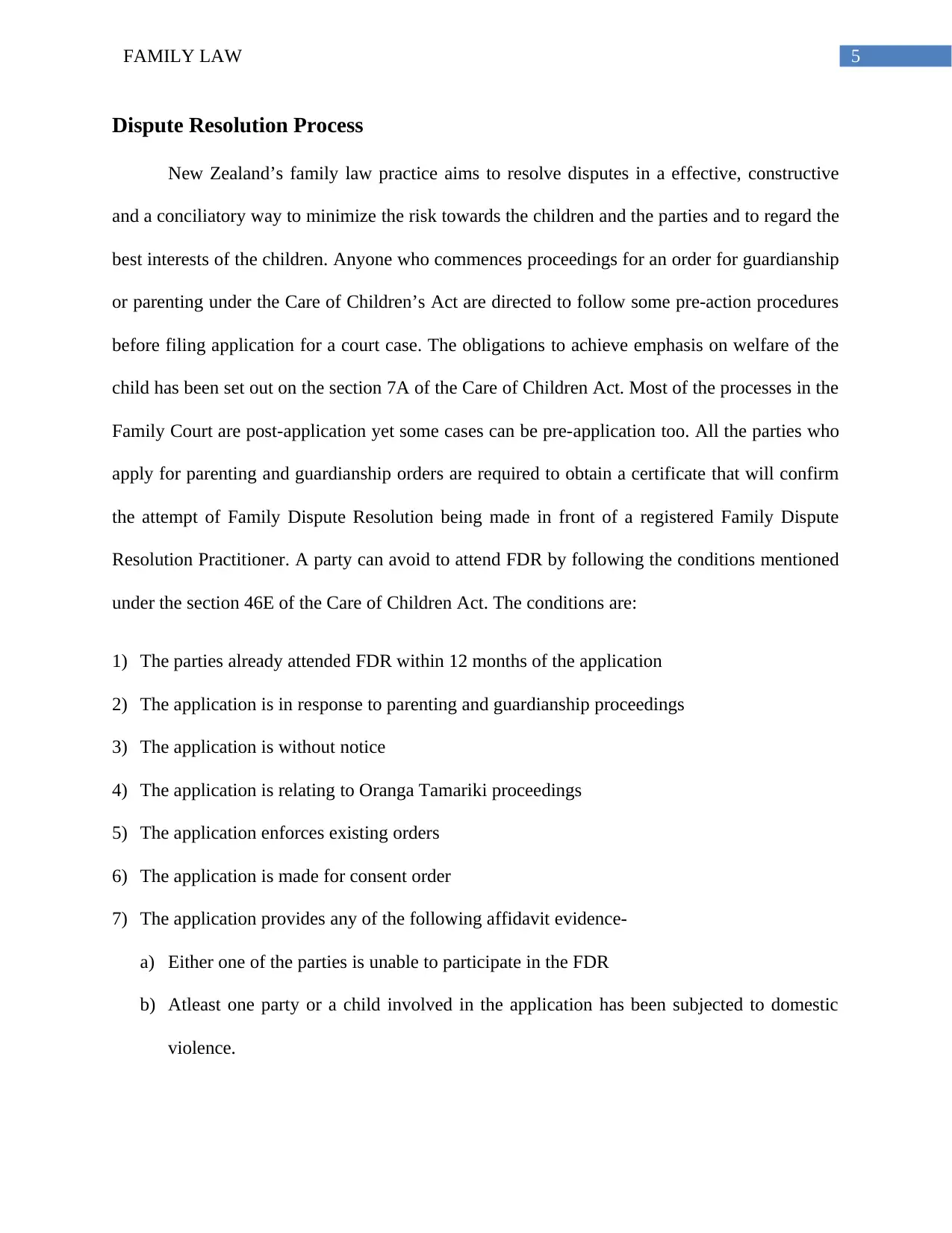
5FAMILY LAW
Dispute Resolution Process
New Zealand’s family law practice aims to resolve disputes in a effective, constructive
and a conciliatory way to minimize the risk towards the children and the parties and to regard the
best interests of the children. Anyone who commences proceedings for an order for guardianship
or parenting under the Care of Children’s Act are directed to follow some pre-action procedures
before filing application for a court case. The obligations to achieve emphasis on welfare of the
child has been set out on the section 7A of the Care of Children Act. Most of the processes in the
Family Court are post-application yet some cases can be pre-application too. All the parties who
apply for parenting and guardianship orders are required to obtain a certificate that will confirm
the attempt of Family Dispute Resolution being made in front of a registered Family Dispute
Resolution Practitioner. A party can avoid to attend FDR by following the conditions mentioned
under the section 46E of the Care of Children Act. The conditions are:
1) The parties already attended FDR within 12 months of the application
2) The application is in response to parenting and guardianship proceedings
3) The application is without notice
4) The application is relating to Oranga Tamariki proceedings
5) The application enforces existing orders
6) The application is made for consent order
7) The application provides any of the following affidavit evidence-
a) Either one of the parties is unable to participate in the FDR
b) Atleast one party or a child involved in the application has been subjected to domestic
violence.
Dispute Resolution Process
New Zealand’s family law practice aims to resolve disputes in a effective, constructive
and a conciliatory way to minimize the risk towards the children and the parties and to regard the
best interests of the children. Anyone who commences proceedings for an order for guardianship
or parenting under the Care of Children’s Act are directed to follow some pre-action procedures
before filing application for a court case. The obligations to achieve emphasis on welfare of the
child has been set out on the section 7A of the Care of Children Act. Most of the processes in the
Family Court are post-application yet some cases can be pre-application too. All the parties who
apply for parenting and guardianship orders are required to obtain a certificate that will confirm
the attempt of Family Dispute Resolution being made in front of a registered Family Dispute
Resolution Practitioner. A party can avoid to attend FDR by following the conditions mentioned
under the section 46E of the Care of Children Act. The conditions are:
1) The parties already attended FDR within 12 months of the application
2) The application is in response to parenting and guardianship proceedings
3) The application is without notice
4) The application is relating to Oranga Tamariki proceedings
5) The application enforces existing orders
6) The application is made for consent order
7) The application provides any of the following affidavit evidence-
a) Either one of the parties is unable to participate in the FDR
b) Atleast one party or a child involved in the application has been subjected to domestic
violence.
⊘ This is a preview!⊘
Do you want full access?
Subscribe today to unlock all pages.

Trusted by 1+ million students worldwide
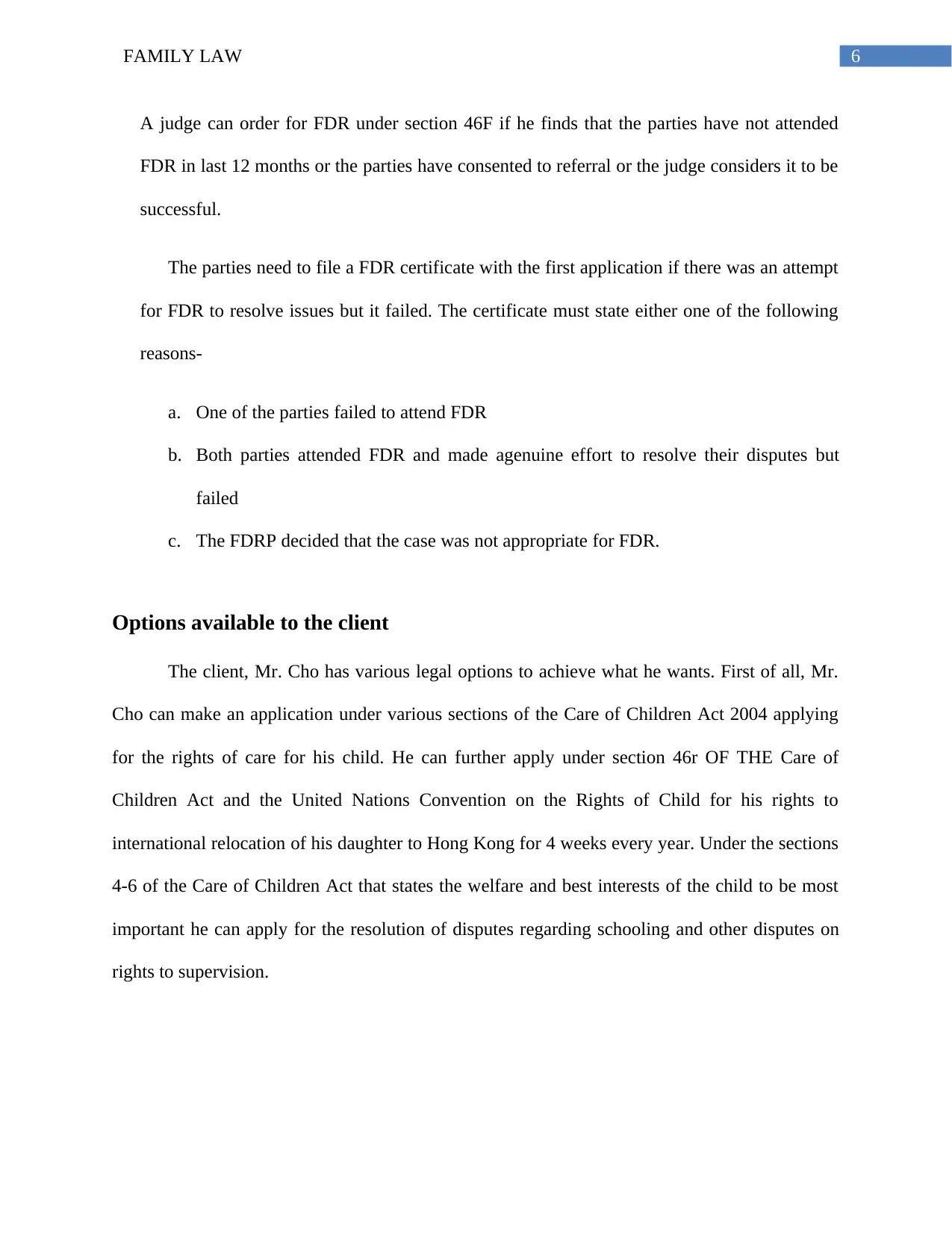
6FAMILY LAW
A judge can order for FDR under section 46F if he finds that the parties have not attended
FDR in last 12 months or the parties have consented to referral or the judge considers it to be
successful.
The parties need to file a FDR certificate with the first application if there was an attempt
for FDR to resolve issues but it failed. The certificate must state either one of the following
reasons-
a. One of the parties failed to attend FDR
b. Both parties attended FDR and made agenuine effort to resolve their disputes but
failed
c. The FDRP decided that the case was not appropriate for FDR.
Options available to the client
The client, Mr. Cho has various legal options to achieve what he wants. First of all, Mr.
Cho can make an application under various sections of the Care of Children Act 2004 applying
for the rights of care for his child. He can further apply under section 46r OF THE Care of
Children Act and the United Nations Convention on the Rights of Child for his rights to
international relocation of his daughter to Hong Kong for 4 weeks every year. Under the sections
4-6 of the Care of Children Act that states the welfare and best interests of the child to be most
important he can apply for the resolution of disputes regarding schooling and other disputes on
rights to supervision.
A judge can order for FDR under section 46F if he finds that the parties have not attended
FDR in last 12 months or the parties have consented to referral or the judge considers it to be
successful.
The parties need to file a FDR certificate with the first application if there was an attempt
for FDR to resolve issues but it failed. The certificate must state either one of the following
reasons-
a. One of the parties failed to attend FDR
b. Both parties attended FDR and made agenuine effort to resolve their disputes but
failed
c. The FDRP decided that the case was not appropriate for FDR.
Options available to the client
The client, Mr. Cho has various legal options to achieve what he wants. First of all, Mr.
Cho can make an application under various sections of the Care of Children Act 2004 applying
for the rights of care for his child. He can further apply under section 46r OF THE Care of
Children Act and the United Nations Convention on the Rights of Child for his rights to
international relocation of his daughter to Hong Kong for 4 weeks every year. Under the sections
4-6 of the Care of Children Act that states the welfare and best interests of the child to be most
important he can apply for the resolution of disputes regarding schooling and other disputes on
rights to supervision.
Paraphrase This Document
Need a fresh take? Get an instant paraphrase of this document with our AI Paraphraser
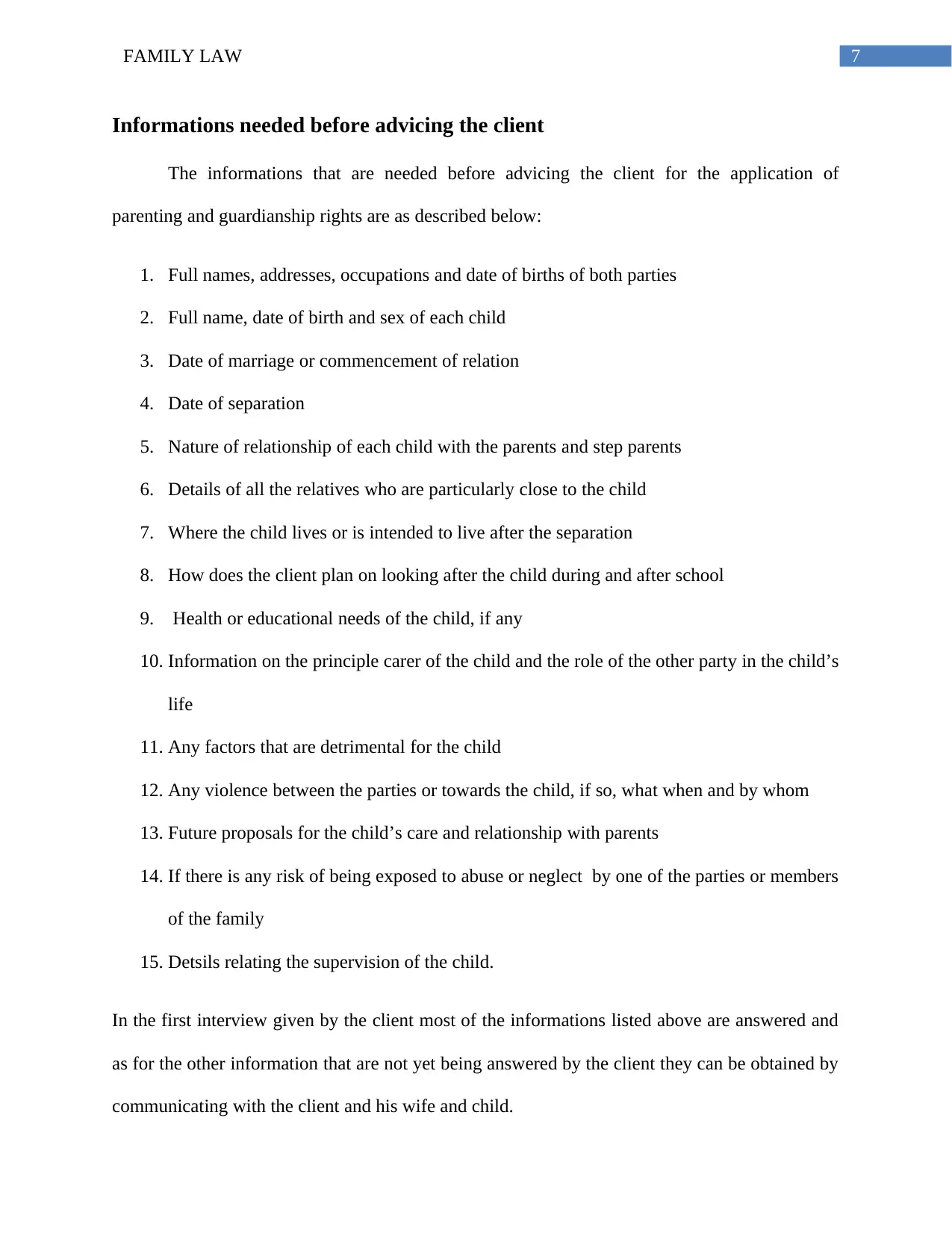
7FAMILY LAW
Informations needed before advicing the client
The informations that are needed before advicing the client for the application of
parenting and guardianship rights are as described below:
1. Full names, addresses, occupations and date of births of both parties
2. Full name, date of birth and sex of each child
3. Date of marriage or commencement of relation
4. Date of separation
5. Nature of relationship of each child with the parents and step parents
6. Details of all the relatives who are particularly close to the child
7. Where the child lives or is intended to live after the separation
8. How does the client plan on looking after the child during and after school
9. Health or educational needs of the child, if any
10. Information on the principle carer of the child and the role of the other party in the child’s
life
11. Any factors that are detrimental for the child
12. Any violence between the parties or towards the child, if so, what when and by whom
13. Future proposals for the child’s care and relationship with parents
14. If there is any risk of being exposed to abuse or neglect by one of the parties or members
of the family
15. Detsils relating the supervision of the child.
In the first interview given by the client most of the informations listed above are answered and
as for the other information that are not yet being answered by the client they can be obtained by
communicating with the client and his wife and child.
Informations needed before advicing the client
The informations that are needed before advicing the client for the application of
parenting and guardianship rights are as described below:
1. Full names, addresses, occupations and date of births of both parties
2. Full name, date of birth and sex of each child
3. Date of marriage or commencement of relation
4. Date of separation
5. Nature of relationship of each child with the parents and step parents
6. Details of all the relatives who are particularly close to the child
7. Where the child lives or is intended to live after the separation
8. How does the client plan on looking after the child during and after school
9. Health or educational needs of the child, if any
10. Information on the principle carer of the child and the role of the other party in the child’s
life
11. Any factors that are detrimental for the child
12. Any violence between the parties or towards the child, if so, what when and by whom
13. Future proposals for the child’s care and relationship with parents
14. If there is any risk of being exposed to abuse or neglect by one of the parties or members
of the family
15. Detsils relating the supervision of the child.
In the first interview given by the client most of the informations listed above are answered and
as for the other information that are not yet being answered by the client they can be obtained by
communicating with the client and his wife and child.
1 out of 8
Related Documents
Your All-in-One AI-Powered Toolkit for Academic Success.
+13062052269
info@desklib.com
Available 24*7 on WhatsApp / Email
![[object Object]](/_next/static/media/star-bottom.7253800d.svg)
Unlock your academic potential
Copyright © 2020–2026 A2Z Services. All Rights Reserved. Developed and managed by ZUCOL.





